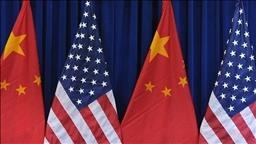China-US relations 'headed to worst ever times'
As China moves to restrict military communication with US over Taiwan trip, experts fear ties are descending to all-time low

ISTANBUL
China's suspension of high-level military contacts and climate change cooperation with the US, triggered by House Speaker Nancy Pelosi's recent trip to Taiwan, indicate that bilateral ties between Beijing and Washington are at what one scholar fears is their "worst ever."
"The relations have never been worse than this," Andrew K.P. Leung, an international and independent China Strategist in Hong Kong, told Anadolu Agency, underlining the "push back" that had emerged in the US against Beijing.
"This is a whole-of-society kind of confrontation, starting with the trade war during former President Donald Trump's time," said Leung, adding that this confrontation now extended to Taiwan and Hong Kong, as well as the areas of technology -- including 5G, information, and narrative rhetoric between the two capitals.
Beijing on Friday introduced sanctions against Pelosi and her family, announcing eight countermeasures against the US, including the cancelation of a phone call between the leaders of US and Chinese military theaters, a working meeting between the Chinese and US Defense Departments, and suspension of China-US cooperation on illegal immigrants, drug control, and climate change.
These measures came after Pelosi defied warnings from Beijing against going to Taiwan, which China considers its "breakaway province," earlier this week during her four-nation East Asia tour.
The People's Liberation Army of China has also been conducting massive joint exercises in territorial waters and airspace of Taiwan, including live-fire drills and blasting ballistic missiles over the self-ruled island into the economic zone of Japan.
Beijing, however, says Japan and China have not yet designated maritime borders.
The unprecedented military exercises came in response to Pelosi's trip to Taiwan earlier this week.
US Secretary of State Antony Blinken called China's military response an "overreaction," and said there was "no justification" for Beijing's actions.
"The fact is the speaker’s visit was peaceful. There is no justification for this extreme, disproportionate, and escalatory military response," Blinken told a news conference in Cambodia, where he was attending a summit of the Association of Southeast Asian Nations.
Pelosi is the first sitting speaker of the US House of Representatives to visit Taiwan in the past 25 years.
She led a delegation of US lawmakers that began their trip from Singapore on Monday, followed by Malaysia, from where she traveled to Taiwan, triggering Beijing's angry response.
She left Taiwan on Wednesday evening for South Korea and finally landed in Tokyo on Thursday night to conclude her visit on Friday.
Taiwan was not mentioned in Pelosi's official tour agenda.
'Straw which broke the camel's back'
Einar Tangen, a senior fellow at the Beijing-based Taihe Institute, told Anadolu Agency that Pelosi's Taiwan visit was to "detract from the (Joe Biden) government's inability to deal with inflation and domestic discord."
"(So,) the logical response (to the US) is economic," said Einar, referring to China's reaction to Washington.
Striking a pessimistic tone, Einar said Pelosi "single-handedly destroyed the basis of China-US relations," describing her move as "the straw which broke the camel's back."
Einar suggested that China's best response would be to "cut back the number of Chinese Consulates in the US, and US Consulates in China and then put tariffs on exports to the US."
Andrew said there was "bipartisan consensus in the US that China is a threat to the American-led world order."
"The US is seeming to be aligning with its Western allies to confront China," he said, pointing to the closure of China's Confucius Institutes by many of Washington's allies and scrutiny of Chinese students.
Beijing and Washington are also engaged in military confrontation in the hotly contested South China Sea and Washington has insisted it would continue its maritime operations in the Taiwan Strait.
On China's response to Pelosi's trip, he said it appeared to be an effort to "decouple" any kind of ties with the US -- a relationship that he said was producing "nothing good" for China.
"America seems to be hellbent to confront Beijing," he added.
Communication indispensable to avoid misunderstanding
Jingdong Yuan, a China-focused scholar at the Stockholm International Peace Research Institute (SIPRI), told Anadolu Agency that China's response was "expected" but that these "suspensions will eventually phase out," allowing Beijing and Washington to resume dialogue and contacts.
"They are strong, unequivocal, but really confined to areas that would not threaten the unraveling of bilateral relations," he explained.
"This is the moment for China to send a clear message: When you hurt our interests, don't expect any cooperation from us," the scholar said about Beijing's suspension of high-level military contacts and maritime cooperation with the US.
But, he added, few contacts "are critical and needed" as both sides are conducting military drills, with close encounters on a regular basis.
"Accidents will occur and communication should remain open to avoid misunderstanding and prevent minor incidents from escalating to major ones," Yuan said.
Though formal meetings are suspended, this may not preclude other, emergency-oriented measures, such as hotlines, he said, adding that these may still continue to function between the two militaries.
In previous meetings with the US, both civilian and military leaders in China had mentioned developing "guardrails" to prevent incidents from escalating to serious confrontation and major clashes, the SIPRI scholar noted.
"Now, Beijing basically 'cancels,' not 'suspends,' the military exchanges. This is rather serious but one can see how upset Beijing is," Yuan said.
Anadolu Agency website contains only a portion of the news stories offered to subscribers in the AA News Broadcasting System (HAS), and in summarized form. Please contact us for subscription options.







